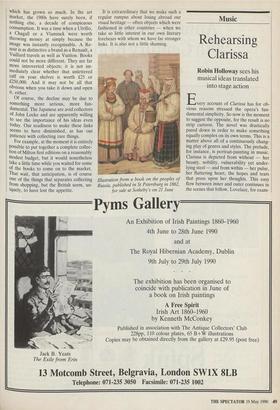Music
Rehearsing Clarissa
Robin Holloway sees his musical ideas translated into stage action Every account of Clarissa has for ob- vious reasons stressed the opera's fun- damental simplicity. So now is the moment to suggest the opposite, for the result is no strip cartoon. The novel was drastically pared down in order to make something equally complex on its own terms. This is a matter above all of a continuously chang- ing play of genres and styles. The prelude, for instance, is portrait-painting in music. Clarissa is depicted from without — her beauty, nobility, vulnerability yet under- lying steel — and from within — her pulse, her fluttering heart, the hopes and tears that press upon her thoughts. This easy flow between inner and outer continues in the scenes that follow. Lovelace, for exam- ple, is heard and seen not because he is there but because he's in her mind.
So when the members of her Family begin to enter it is not at first clear whether they too are figments or real. The Family en masse are stylised as high-grotesque, even in their spiteful power. They collapse comically like the pack of cards when Alice grows a mile high; but the unseen father cursing his disobedient daughter should put the fear of God into every listener in the house. The heroine's big moment is pure grand opera: a distressed damsel rescued at her darkest hour by a shining deliverer. But what follows, in a formalised chess game of exchanges between the damsel and her knight, alternating with monologues where each expresses their true reaction, is, I think, without operatic precedent. It requires film-like intercut- ting, yet sustained attention to the in- creasingly painful undercurrents of their formalised arguments, all the time heading for disaster however decorous the conver- sational surface. Naturalism here would clearly never articulate such a combina- tion. After which, the Act I finale with its magic fire in the brothel and 'scenes of confusion, panic and fun' culminating in Clarissa's escape are pure circus, exuber- ant, highly-coloured and surrealist, even while the underlying story makes a further decisive move towards the inevitable crisis.
Such kaleidoscopic changes of focus, latent in the piece, have been seized upon and heightened by the producer as his basic working mode. 'The stage has its reasons' indeed! and my own quite elaborate direc- tions have been almost entirely cast to the winds. Yet I am not outraged by such blatant ravishment. I realise the enormous problem posed to producer and choreog- rapher by the score's dependence upon music alone. Act II must have as much wordless music as singing, if not more. My inspiration was always from inner emotion into orchestral utterance, whether for a hedonistic waltz-dream where secret de- sires dance in happy abandon, a lament for lost virginity that evolves towards acquiesc- ence in fate, a pair of complementary dreams for the heroine shortly before her death, or the choral tableaux as she finally departs. My idea of what might actually be seen during all this was pretty vague. I've watched astonished and (for the most part) entranced as the long stretches of sym- Phony concert have been peopled and animated.
Boldest of all is the decision to stage the crucial rape and lament when I'd requested obscurity for the one and the curtain to descend for the other. I now see that the spectacle would have a yawning hole if these instructions were carried out. The orchestra would flail away, then wail and beat its breast; but the audience would revert to chocolates, handbags, program- mes and thoughts of parking meters. The line would be fatally slackened, if not broken altogether. So I recognise sensitivity to the spirit, if not fidelity to the letter, of my score; together with a high degree of sustained visual inventiveness. And as a self- confessed traducer of Richardson's novel I can hardly complain! In one thing only producer and composer have not seen eye to eye. There is a discrepancy so consistent as to be a matter of artistic temperament between my ideal of utter stillness for certain significant moments where the ac- tion pauses — semi-colons in the architecture, derived unconsciously from the beautiful stasis of Siegfried stretched at length in the forest, or the empty garden that begins the second half of Ravel's L'enfant et les sortileges — and David Pountney's concern to fill every moment • with movement, thus possibly detracting from the places where activity and bustle are essential. This is piquant because in real life my character is fretted by fuss and worry whereas Pountney — like Oliver Knussen, the endlessly lucid and illuminat- ing conductor — appears all superhuman patience and calm. What has fascinated, from the earliest play-through with singers and piano in an overheated rehearsal studio in north Lon- don, to last week's translation to the vast spaces of the Coliseum stage, is the skill, complexity and diversity of the processes — human, mechanical, institutional whereby a conception so personal that it seemed like a private secret comes into being in all its detail of flesh and blood, greasepaint and costumes, vast stage con- structions that move like dinosaurs court- ing and occasionally collide like asteroids off orbit. The experience, completely ex- hausting, has yet been a thrill whose immediate upshot is the desire to write further operas taking this apparatus as their starting rather than their terminal point. But there is no doubt whatever that if I'd known it all before, I would not have been capable of imagining, then writing, Clarissa.



































































 Previous page
Previous page